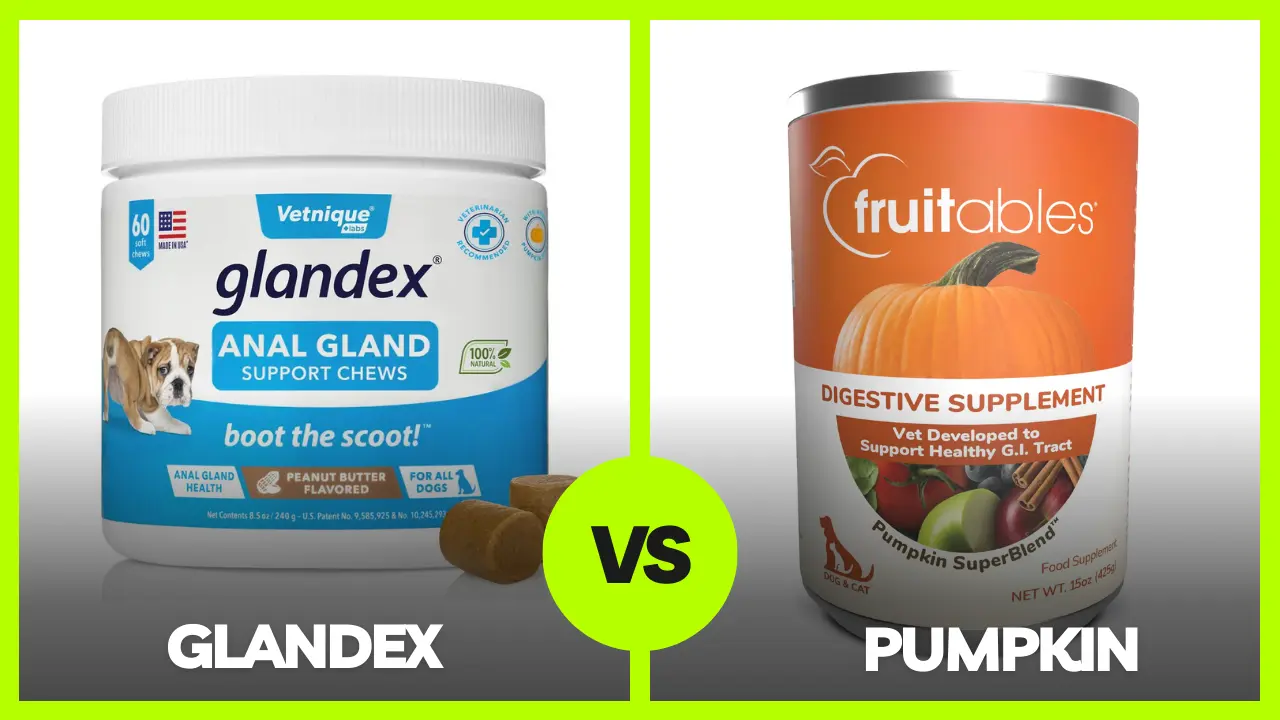Dog owners understand that caring for their pets entails more than simply walks and belly rubs. Anal gland disorders are one type of health problem that dogs might have that necessitate specialised care.
Anal glands are positioned on either side of a dog’s rectum and secrete a chemical that aids in marking and identification.
When these glands become clogged or infected, however, they can cause discomfort and even major health problems.
Glandex and pumpkin are two popular alternatives for treating anal gland disorders in dogs.
Glandex is a supplement designed exclusively for the treatment of anal glands in dogs, whilst pumpkin is a natural therapy that can aid in bowel motions.
Both options offer advantages and disadvantages, and dog owners should be aware of the distinctions.
In this article, we’ll compare Glandex with pumpkin to see which one is best for your pet.

Understanding Anal Gland Problems
What are anal glands?
Anal glands, also known as anal sacs, are tiny pockets placed on either side of the anus of a dog.
These glands secrete a foul-smelling fluid that is utilised for marking territory and identifying other canines.
The fluid is generally produced after bowel movements, however the glands might become clogged and fail to empty adequately at times.
Also Read
- Nulo Medal Series vs Nulo Freestyle Dog Food Honest Review
- Open Paddock Dog Food Review In 2023 | Pros and Cons
- Homemade Teething Toys for Puppies: Easy and Safe DIY Ideas
What causes anal gland problems?

There are several factors that can contribute to anal gland problems in dogs. These include:
- Obesity
- Insufficient dietary fiber
- Chronic soft stool
- Food and/or environmental allergies
- Genetics
While it’s more common for smaller breeds to develop issues with their anal glands, no breed is immune.
What are the symptoms of anal gland problems?
When a dog’s anal glands become affected or diseased, the following symptoms may occur:
- Scooting or dragging their bottom on the ground
- Licking or biting at the anus
- Foul odor coming from the anus
- Pain or discomfort when sitting or defecating
- Swelling or redness around the anus
Anal gland problems, if left untreated, can develop to more serious complications such as abscesses or infections.
Refer to the table below to better understand the distinction between Glandex and pumpkin as anal gland treatments:
| Glandex | Pumpkin |
| Specifically formulated to promote healthy anal gland function | A good supplement to use in a dog’s diet |
| Contains natural ingredients such as pumpkin seed powder, digestive enzymes, and probiotics | Contains high levels of fiber, which can help bulk up stool and promote regular bowel movements |
| Can be used as a preventative measure or to treat existing anal gland problems | May not be as effective for dogs with severe anal gland issues |
| Available in several forms including chews, soft chews, and powder | Can be added to a dog’s food or given as a standalone treat |
Dog owners can better decide the best treatment for their furry buddy if they understand the origins and symptoms of anal gland disorders.
Also Read
- Kirkland Puppy Food Feeding Guidelines and Review In 2023
- Homemade Anti-Inflammatory Dog Food: Recipes and Benefits
- Homemade Dog Food Recipes for Gastrointestinal Problems In 2023

Treatment Options
For a dog’s anal gland condition, there are numerous therapy choices. Glandex and pumpkin are two popular choices.
Glandex
Glandex is a supplement that promotes the health of a dog’s anal glands.
It has a unique combination of components that help to reduce inflammation and support healthy bowel motions, such as pumpkin seed, probiotics, and fibre.
Glandex comes in chewable pills and peanut butter treats, making it simple to give to your dog.

According to a Glandex review, this supplement has various advantages.
It can assist to lessen the frequency of anal gland expression, saving you money on veterinarian expenditures.
Glandex can also aid with digestive and anal gland disorders, making it a diverse therapeutic option.
Pumpkin
Pumpkin has been used for generations to cure a number of digestive problems, including constipation and diarrhoea.
It is high in fibre, which might help your dog’s stool thicken up and flow more easily. Pumpkin is also high in vitamins and minerals such as vitamin E and magnesium.
A vet on FluentWoof claims that pumpkin can be a viable therapy choice for a dog’s anal gland condition.
It can aid in the promotion of regular bowel motions and the reduction of inflammation in the anal glands.
Furthermore, pumpkin is simple to integrate into your dog’s food. You can feed canned pumpkin to your dog or offer him pumpkin treats.
| Treatment Options | Benefits |
| Glandex | – Reduces frequency of anal gland expression- Addresses digestive and anal gland issues- Available in chewable tablets and peanut butter treats |
| Pumpkin | – Promotes regular bowel movements- Reduces inflammation in anal glands- Easy to incorporate into your dog’s diet |
Glandex and pumpkin can both be helpful treatments for a dog’s anal gland condition.
Glandex is a supplement with a unique combination of components, whereas pumpkin is a natural cure high in fibre.
Consult your veterinarian to establish which treatment option is best for your dog’s individual needs.

Effectiveness of Glandex vs Pumpkin
Studies on Glandex
According to a FluentWoof review, Glandex is successful in most dogs within 3-5 weeks of treatment.
It is designed specifically for anal glands in dogs and can help prevent and treat anal gland illness.
Glandex has a natural ingredient blend, including pumpkin seed powder, which can help support healthy bowel motions and alleviate anal gland inflammation.
Glandex was proven to be beneficial in reducing the incidence of anal gland disorders in dogs in a 2018 study published in the International Journal of Veterinary and Animal Medicine.
Glandex was likewise shown to be well-tolerated by dogs, with no adverse effects recorded.
Studies on Pumpkin
Although pumpkin is a healthy supplement for a dog’s diet, it is not specifically designed to treat anal glands.
It can be prepared or fed raw to dogs to aid in the promotion of good bowel motions. Fibre, according to PetMD, can help avoid anal gland disorders by producing regular bowel movements.
While no studies have been conducted to determine the efficacy of pumpkin in treating anal gland disorders in dogs, some veterinarians recommend using pumpkin in a dog’s food as part of a holistic approach to anal gland health.
However, if a dog is experiencing anal gland difficulties, pumpkin should not be utilised as a substitute for veterinary attention.
| Glandex | Pumpkin | |
| Effectiveness | Effective in most dogs within 3-5 weeks | Good supplement for promoting healthy bowel movements |
| Specificity | Made for handling anal glands on dogs | Not specifically made for anal gland problems |
| Ingredients | Contains a blend of natural ingredients, including pumpkin seed powder | Can be cooked or fed raw |
| Studies | Found effective in reducing incidence of anal gland problems in dogs | No studies specifically on effectiveness for anal gland problems |
| Caution | May cause constipation in some dogs | Should not be used as a substitute for veterinary care |

Side Effects and Risks
Side Effects of Glandex
Glandex is typically safe for pets and has no significant negative effects.
However, due to the increased fibre content, moderate side effects such as diarrhoea, mushy stools, or upset stomach may occur when your pet first begins taking Glandex.
To avoid side effects, it is critical to carefully follow your veterinarian’s dosing instructions.
Side Effects of Pumpkin
Pumpkin is a natural cure for treating anal gland disorders in dogs. It may, however, have certain negative effects.
If consumed in excess, pumpkin can cause diarrhoea and weight gain if not consumed in moderation.
It is critical to consult with your veterinarian about the proper pumpkin dosage for your dog.
Risks of Using Glandex or Pumpkin
While Glandex and pumpkin can be beneficial in treating anal gland disorders in dogs, they are not without dangers.
If your dog gets an infection or abscess in their anal glands, you should seek veterinary assistance right once.
Delaying treatment might result in major problems, such as infection spreading to other parts of the body.
It’s also worth noting that Glandex and pumpkin should never be used in place of regular hygiene and grooming.
Cleaning your dog’s anal area on a regular basis will help avoid the accumulation of germs and other substances in the anal glands, lowering the risk of infection and other issues.
| Glandex | Pumpkin |
| Mild side effects can include diarrhea, soft stools, or upset stomach when first starting your pet on Glandex due to the increased fiber content. | Too much pumpkin can cause diarrhea, and it can also lead to weight gain if not given in moderation. |
| Glandex is generally safe for pets and does not have any major side effects. | Pumpkin is a natural remedy that can be used to treat anal gland problems in dogs. However, it can also have some side effects. |
| It is important to always follow the dosage instructions provided by your veterinarian to avoid any adverse effects. | It is important to talk to your veterinarian about the appropriate dosage of pumpkin for your dog. |
Both Glandex and pumpkin can be used to treat anal gland disorders in dogs.
To avoid any negative consequences, it is critical to use them correctly and under the supervision of a veterinarian.
If your dog is experiencing anal gland difficulties, seek veterinary assistance right away to avoid major complications.

Pros and Cons of Glandex vs Pumpkin
Here are some pros and cons of Glandex vs Pumpkin: Treating a Dog’s Anal Gland Problem:
Glandex
- Pros:
- Glandex is a natural supplement that can help to keep your dog’s anal glands healthy and functioning properly.
- It is made with ingredients that are safe for dogs, such as pumpkin, flaxseed, and probiotics.
- Glandex is easy to give to your dog, as it comes in a capsule form.
- Cons:
- Glandex can be expensive.
- It may not be effective for all dogs.
- Some dogs may experience side effects, such as diarrhea or vomiting.
Pumpkin
- Pros:
- Pumpkin is a natural food that is safe for dogs to eat.
- It is a good source of fiber, which can help to keep your dog’s digestive system healthy.
- Pumpkin is also a good source of vitamins and minerals, which can help to keep your dog’s overall health and well-being.
- Cons:
- Pumpkin may not be as effective as Glandex in treating anal gland problems.
- It may not be palatable to all dogs.

Cost Comparison
Glandex and pumpkin are both common solutions for treating a dog’s anal gland condition. However, there is a huge cost difference between these two treatments.
Glandex is a veterinary-formulated supplement available in soft chews or powder form. Glandex prices vary depending on the size of the package and the store.
A 120-count bottle of Glandex soft chews costs roughly $30 to $35 on average. Glandex powder costs roughly $20 to $25 for a 4.0 ounce jar.
Glandex is available for purchase online from Amazon.com, Chewy.com, and other merchants.
Pumpkin, on the other hand, is a natural and inexpensive addition to a dog’s diet. A can of pumpkin puree costs about $1 to $2 at most supermarket stores.
Pumpkin supplements, such as soft chews or tablets, are also available for purchase. The price of pumpkin supplements vary according to package size and vendor.
A 90-count bottle of pumpkin soft chews typically costs between $10 and $15. Pumpkin vitamins are available from Amazon.com, Chewy.com, and other online stores.
In terms of price, pumpkin is the less expensive alternative.
It is crucial to remember, however, that Glandex is a veterinary-formulated supplement created exclusively to address the underlying causes of anal gland disorders in pets.
While pumpkin can help some dogs, it may not be adequate to address severe or chronic anal gland problems.
The table below compares the average price of Glandex with pumpkin supplements on Amazon.com:
| Supplement | Package Size | Average Cost |
| Glandex Soft Chews | 120-count | $30 to $35 |
| Glandex Powder | 4.0 oz | $20 to $25 |
| Pumpkin Soft Chews | 90-count | $10 to $15 |
| Canned Pumpkin Puree | 15 oz | $1 to $2 |
It is crucial to remember that costs may vary based on the merchant and the size of the product. Before making a purchase, it is best to research prices and read reviews.

Conclusion
Finally, both Glandex and pumpkin can be used to aid dogs with anal gland disorders. They do, however, work in different ways and provide different benefits.
Glandex is a supplement designed to address the root causes of anal gland disorders, such as inflammation, infection, and poor diet.
It contains natural components such as pumpkin seed, probiotics, and digestive enzymes, which support healthy digestion and bowel motions while also reducing inflammation and odour.
Pumpkin, on the other hand, is a natural source of fibre that can assist to firm up stools and encourage regular bowel movements, which can aid in the natural emptying of the anal glands during defecation.
It also has vitamins and minerals that are good for your general health.
While both Glandex and pumpkin can be beneficial, they are not interchangeable.
Glandex is a supplement that is specifically designed to treat anal gland issues in dogs, whereas pumpkin is a general supplement that can assist digestive health in dogs.
Consultation with a veterinarian is the best course of action to diagnose the underlying cause of the anal gland problem and develop a treatment plan that may include supplements Glandex or pumpkin, as well as any necessary medical therapies.

Frequently Asked Questions Related To Glandex vs Pumpkin
Can pumpkin help with a dog’s anal gland problem?
Pumpkin is a natural medicine that can help with anal gland problems in dogs. It contains fibre, which helps regulate bowel movements and promotes healthy digestion. Pumpkin can also aid with stool softening, making it easier for dogs to pass faeces and empty their anal glands. However, pumpkin alone may not be sufficient to treat severe anal gland disorders.
What is Glandex and how does it work?
Glandex is a supplement formulated exclusively for dogs to support and maintain healthy anal gland function. It is made up of a customised blend of natural nutrients such as pumpkin seed powder, probiotics, and digestive enzymes. Glandex acts to prevent impaction and infection by lowering inflammation, encouraging good digestion, and strengthening the muscles surrounding the anal glands.
How often should you give your dog pumpkin for anal gland problems?
The frequency with which pumpkin is supplemented for anal gland disorders is determined on the severity of the condition. For mild cases, a tablespoon of canned or cooked pumpkin added to your dog’s food once a day is recommended. In more severe situations, pumpkin may need to be given twice a day or increased to two tablespoons per dish.
Are there any side effects of using Glandex?
Glandex is generally regarded as safe, with no documented negative effects. However, as with any supplement, it is critical to adhere to the suggested dosage and speak with a veterinarian before use, especially if your dog is on medication or has a pre-existing medical condition.
What other foods can help with a dog’s anal gland problem?
In addition to pumpkin, high-fiber vegetables such as sweet potatoes, green beans, and carrots can aid with a dog’s anal gland condition. Probiotics can also help promote healthy digestion and reduce inflammation in your dog’s diet. It is crucial to remember that food alone may not be sufficient to treat severe cases of anal gland disorders, and it is always preferable to seek the advice of a veterinarian for correct diagnosis and treatment.
Can you use Glandex and pumpkin together to treat anal gland problems?
Yes, Glandex and pumpkin can be used in conjunction to alleviate analgia. In fact, pumpkin seed powder is one of Glandex’s major constituents. The combination of Glandex and pumpkin can aid in the promotion of good digestion, the reduction of inflammation, and the strengthening of the muscles surrounding the anal glands, all of which can aid in the prevention of impaction and infection. However, before utilising any supplements or therapies for anal gland disorders, it is critical to contact with a veterinarian.








